The Facts About Asian American Mental Health and Suicide Rates
Reading Time: 4 minutesNew research reveals that the youth mental health crisis is taking a heavy toll on the Asian American community. Statistics from the CDC show that suicide is the first leading cause of death for Asian American young adults—accounting for one-third of the deaths among Asian Americans aged 20–24. This is the only racial group within this age demographic for whom this is true.
Over the past year, the stressors on Asian American young adults have multiplied. In addition to navigating challenges with employment and education, they have also been subjected to the emotional burden of increased discrimination and racially motivated attacks.
Key Takeaways
- The number of Asian American/Native Hawaiians and other Pacific Islanders (NHOPI) young adults reporting serious mental illness and suicidal behavior have doubled over the last decade.
- Cultural shame around mental health challenges, which are viewed as a weakness, is one of the primary reasons that Asian Americans don’t access treatment.
- 7.4 percent of Asian American/NHOPI young adults (18–25) report an alcohol use disorder.
- Mental health experts and colleges and universities must work to reduce cultural shame and stigma for this population and create greater access to treatment.
Questions?
All calls are always confidential.
Asian American Mental Health Statistics
According to the Substance Abuse and Mental Health Services Administration (SAMHSA), the number of Asian American/Native Hawaiians and other Pacific Islanders (NHOPI) ages 18–25 reporting serious mental illness and serious suicidal thoughts, making a plan for suicide, and attempting suicide have all doubled over the last decade. And Mental Health America reports that one out of every 10 Asian American/Pacific Islander young adults struggles with major depression.
Experts believe that high Asian American suicide rates are due in part to the fact that this group is less likely to report mental health problems and suicidal thoughts, due to cultural shame around mental health challenges. Consequently, they are less likely to receive support and treatment. SAMHSA research found that 77 percent of Asian/NHOPI adults (ages 18 and up) with a mental health condition receive no treatment at all.
Know the Facts
Asian Americans are 60 percent less likely than non-Hispanic white people to receive mental health treatment.
Substance Abuse and Asian American Mental Health
SAMHSA’s report on NHOPI/Asian American mental health and substance abuse found that having a substance abuse disorder significantly increased the risk of suicide among ages 18 and up. The report also found notable increases in substance abuse among adults with mental illness.
Here are some additional substance abuse statistics from the report:
- 7.4 percent of Asian American/NHOPI young adults (18–25) reported an alcohol use disorder.
- 3 percent of this age group abused opioids or pain medication, and 4 percent misused prescription stimulants.
- 12.4 percent of young adults in the study used marijuana in the month prior to the survey, and 4 percent had a marijuana use disorder.
- Cocaine use among Asian/NHOPI young adults has significantly increased since 2017.
Mental Health Stigma in the Asian American Community
The devastating Asian American suicide rate is bringing wider attention to the differences between American vs. Asian views on mental health. Asian American author and psychotherapist Sam Louie, who writes and speaks on mental health in Asian culture, summarizes it like this: “Asian Americans have a three-headed monster to slay in order to obtain emotional health: erasing the stigma of asking for help, finding one’s identity as a minority in the U.S. and facing the cultural norms that act as barriers.”
Cultural shame around mental health challenges, which are viewed as a weakness, is one of the primary reasons that Asian Americans don’t access treatment. In addition, social norms within Asian American culture discourage talking openly about emotions.


Here are some additional factors that contribute to the high rates of mental health stigma and Asian American suicide among young adults:
- Intense pressure to succeed academically and professionally
- Self-blame around “failures” that disgrace the family, such as getting poor grades or going against parental wishes
- Feeling caught between cultures and sets of values—Asian American values that emphasize family and community vs. the individualistic society in which they’ve grown up
- Pressure to uphold the racist myth of Asian Americans as a “model minority” that has successfully integrated into US culture and overcome the challenges of racial bias
- Living in a country where Asian Americans continue to be seen as “foreign” and “other,” as illustrated by the surge in COVID-related hate crimes
- Believing that previous generations who experienced trauma “had it worse,” so their own struggles are not important
- Discrimination, violence, and bullying based on race/ethnicity.
Societal oppression and violence (against Asian Americans) becomes internalized into self-hatred, self-harm and ultimately the self-directed violence that is suicide.
Amelia Noor-Oshiro
PhD candidate in Public Health, Johns Hopkins University
Supporting Asian American Mental Health with Specialized Care for Young Adults
As awareness grows around Asian American mental health challenges, researchers, mental health experts, community and activist organizations, and colleges and universities are working to reduce cultural shame and stigma and create greater access to treatment. Promoting the idea that mental health is as important as physical health is also important for this community. For individuals, speaking freely about mental health issues and being open about seeking professional support is the best way to help decrease stigma.
For therapists, cultural competency—being able to effectively relate to individuals from various groups and backgrounds—is essential in addressing Asian American mental health. At Newport Institute, our clinicians are trained in cultural competency so they can bring to their work a deeper understanding of the background and values that inform the way clients see themselves and the world. Our whole-person approach to young adult treatment empowers individuals to learn their own self-worth and to embrace the culture and community that has shaped them—while forging their own unique path toward happiness and fulfillment. Contact us today to learn more.

